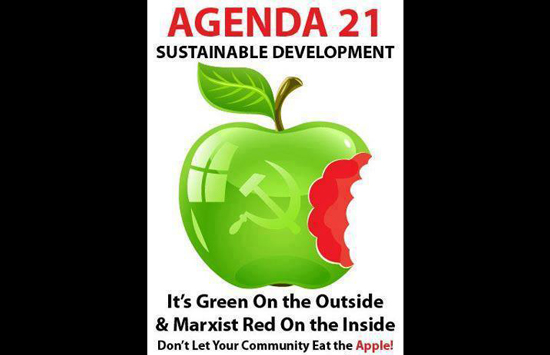Agenda 21: Awareness and Activism + UN 2030 Agenda Decoded: Blueprint for the Global Enslavement of Humanity under Corporate Masters (4)
Sustainable Development: The Transformation of the Western World
Read the third part of the article
How to Fight Back Against Sustainable Development

Be aware of the world in which your elected officials live. It comes wrapped in a plain green package labelled “Smart Growth” or “Sustainability”.
To begin the effort to fight back against Sustainable Development it is vital to first understand the massive structure you are facing. You need to know who the players are and you need to understand the political world your officials are operating in.
This may help you to understand that perhaps they aren’t all evil globalists, but, perhaps, good people who are surrounded by powers that won’t let them see the reality of the policies they are helping to implement.
This is not making excuses for them, but before you rush in and start yelling about their enforcing UN policies on the community, here are some things you should consider.
In most US communities, the mayor, city council members and county commissioners are automatically members of national organizations like the National Conference of Mayors, National League of Cities, and the national associations for city council members, and the same for commissioners.
Those in the state government also have the National Governors Association and state legislators have their national organization.
For the past twenty years or more, each and every one of these national organizations have been promoting Sustainable Development and related policies. The National Mayors Conference and the National Governors Association have been leaders in this agenda, many times working directly with UN organizations to promote the policy.
That is the message your local elected leaders hear; from the podium; from fellow officials from other communities; from “experts” they’ve been told to respect; in committee meetings; from dinner speakers; from literature they are given at such meetings.
They are told of legislation that will be soon be implemented, and they are even provided sample legislation to introduce in their communities.
Back home, they are surrounded by a horde of “stakeholder” groups, each promoting a piece of the agenda, be it policies for water control, energy control, development control, specific building materials control, historic preservation and control of “downtown” development, conservation easements and development rights for control of rural property.
These groups like ICLEI, the American Planning Association, the Renaissance Planning Group, and many more, are heavily involved with state and federal plans. They arrive in your community with blue prints, state and federal plans, grants and lots of contacts in high places. There are official programs for “going green,” “comprehensive land use plans”, and lots of programs for the kids in the classrooms.
There is also a second horde involved in the Sustainablist invasion – state and federal agency officials including EPA agents; air and water quality agents; Interior Department officials, HUD officials, energy officials, Commerce Department officials, and on and on – all targeting your locally elected officials with policy, money, regulations, reports, special planning boards, meetings, and conferences, all promoting the exact same agenda.
And don’t forget the news media, both locally and nationally, also promoting the Sustainablist agenda, attacking anyone not going along, ready to quickly use the “extremist” label against them.
The message is clear – Sustainable Development is reality – politically correct, necessary, unquestionable, and it has “consensus”.
Is your head spinning yet? Think of the affect all of this has on a poor local official who just thought he would run for office and serve his community. This is his reality. This is what he thinks government is supposed to be because, after all, everyone he is dealing with says so.
Now, as he is surrounded by all of these important, powerful folks, along comes a local citizen who tells him that some alternative media website says all of these programs are from the UN and are taking away our liberty. “Who? They said what? Come on, I’m not doing that. And I don’t have time to talk about it. I have another meeting to go to.”
If we are going to successfully fight Agenda 21, it is vitally important that we all recognize this reality as we plan to deal with it and defeat it. With that in mind, following are some ideas.
How to Fight Back

First and foremost, don’t try to fight alone. If you try to attend local meetings by yourself you will be ignored. You will need others to plan and implement strategy.
You have family and friends. Start with them. Ask them to help look into some local policies. Even if they start off skeptical about your concerns, it won’t take them long to see the truth.
Check out if there is a local tea party or even a local Republican group. Churches are a target of such policies. Alert people at your church and ask them to help fight back. Find people to help you!
Research: Don’t even begin to open up a fight until you know certain details. First, who are the players in your community. What privately funded “stakeholder” groups are there? What is their agenda?
What other communities have they operated in? What projects? What results? Who are their members in your community?
Are they residents or did they come from “out of town?” (That could prove to be valuable information later in the fight). Finding this information may be the hardest of your efforts. They like to operate out of the spotlight.
It’s not likely that the town will carry official documentation of who it is working with. It probably will require that you attend lots of meetings and hearings. Take note of who is there and their role. Do this quietly. Don’t announce to the community what you are doing. Don’t make yourselves a target. You may have to ask questions and that may raise some eyebrows. But stay out of the way as much as possible.
Second, get all the details on the plans your community is working on. Has there already been legislation passed? Most of this information can be found on the town website. Knowing this information will help you put together a plan of action.
Once you have it, you can begin to take your fight public.
With the information you have gathered, begin to examine the effect the policies will have on the community and its residents. Find who the victims of the legislation or regulation may be. This will be of great value as you confront city council. People understand victim stories – especially if it is them. It is the best way to undermine the process – and help get people to join your cause.
You will find that Conservation Easements have raised taxes as much of the US county land is removed from the tax rolls – someone has to make up for the lost revenue and the payment of easements. Are “stakeholder” groups helping to get landowners to sign up for the easements – and if so – do they get any kind of kickbacks?
Who are getting the easements? You may find the rich land owners have found a great loophole to cut their own property taxes as the middle class makes up the short fall. This will help bring usually disinterested people to your cause.
Does the community plan call for reduction of energy use? If so, look for calls for energy audits and taxes on energy use. The audits mean that the government has set a goal to reduce energy use. It may follow that government agents are going to come into your home to inspect your energy use.
Then they are going to tell you what must be done in your home to cut usage. That will cost you money. Don’t fall for the line that it is all voluntary – to help you save money.
They haven’t gone to this much trouble to be ignored. Regulations are not voluntary.
These are just a couple of examples of what to look for as you do your research.
There are many more, including meters on wells to control water use, smart meters to take away your control of your thermostat; non elected boards and councils to control local development and implement smart growth, leading to population growth; Public / Private Partnerships with local and large corporations to “go green”, creation of open space; pushing back live stock from streams, enforcing sustainable farming methods that restrict energy and water use in farming practices; and much more.
It all leads to higher costs and shortages, in the name of environmental protection and conservation and controlling growth (anti-sprawl, they call it).
Your goal is to stop Sustainable Development in your community. That means a campaign to stop the creation of non-elected regional government councils that are difficult to hold accountable.
It means to stop local governments from taking grants that come with massive strings attached to enforce compliance.
And it means you must succeed in removing outsider organizations and “stakeholder” groups that are pressuring your elected officials to do their bidding.
Civic Action: Armed with as much information as you can gather (and armed with the ability to coherently discuss its details) you are ready to take your battle to the public.

First, it would be better for you to try to discuss it privately with some of your elected officials, especially if you know them. Tell them what you have found and explain why you are opposed.
First discuss the effects of the policies on the average citizen. Explain why they are bad. Only very slowly should you bring the conversation around to the origin of such polices – Agenda 21 and the UN. Don’t start there. It is important that you build the case to show that these policies are not local, but part of a national and international agenda. If this conversation does not go well (and it probably won’t) then you have to take it to the next level – to the public.
Begin a twofold campaign. First, write a series of letters to the editor for the local newspaper. Make sure that you are not alone.
Coordinate your letters with others who will also write letters to back up and support what you have written. These will generate more letters from others, some for your position and others against you.
Be prepared to answer those against you as they are probably written by those “stakeholders” who are implementing the policies in the first place. This may be a useful place for you to use what you’ve learned about these groups to discredit them.
Second, begin to attend Council meetings and ask questions. The response from the council members will determine your next move. If you are ignored and your questions met with silence or hostility, prepare a news release detailing your questions and the background you have as to why you asked those questions.
Pass the news release out to the people at the next meeting as well as the news media. Attend the next meeting and the next, demanding answers. Be sure to organize people to come with you.
Don’t try this alone. If necessary, have demonstrators outside city hall carrying signs or handing out flyers with the name and picture of the officials who won’t answer your questions along with the question you asked – including the details you have about the policy.
The point in all of this is to make the issue public. Take away their ability to hide the details from the public. Expose the hoards of outsiders who are dictating policy in your community. Force the people you elected to deal with you – not the army of self-appointed “stakeholders” and government officials. Shine a very right spotlight on the roaches under the rock.
If the newspaper is with you, great, but you will probably find it working with the other side. It may be difficult to get a fair shake in the newspaper or on radio.
That’s why you deliver your news releases to both the media and the public. Get signs, and flyers in stores if necessary. And keep it up for as long as it takes. Don’t stop the public demonstration until you had acquired victory, or at least started a public debate.
The final step is to use the energy you have created to run candidates for office against those who have ignored and fought you. Ultimately, that is the office holders’ worst nightmare and may be the most effective way to get them to respond and serve their constituents.
New Tactic
As mentioned in the beginning, over the past couple of years, as we’ve educated people on Agenda 21 and its UN origins, the natural reaction by concerned citizens and activists has been to rush into city hall and accuse their elected representatives of implementing international policies on the town.
This has, of course, been met with skepticism and ridicule on the part of some of the elected officials (egged on by the NGO stakeholder groups and planning organizations).
Today, the promoters of Agenda 21, including ICLEI and the American Planning Association (APA) have worked overtime to paint any movement against them as “crazed conspiracy theorists wearing tin foil hats and hearing voices”.
So, it’s time to change tactics.
Here is an undeniable fact: Agenda 21 / Sustainable Development cannot be enforced without usurping or diminishing private property rights. So, we need to begin to challenge the plans that affect private property rights.
However, as we move in that direction, we must have a clear understanding of what property rights are. Many people today have little or varying ideas of property rights.

Forty years ago people understood things like “No Trespassing”, “My home is my castle” and “step across that line and suffer the consequences”. Such ideas today seem quaint and antiquated to many, especially with government invading private property at will. Sometimes, in order to purchase property or to get access to services, we sign documents that say government or utility agents are free to come on our property at will. The idea of “Keep Out” is almost unheard of.
However, to demand that your private property be honored and protected a definition must be established before you start the effort.
As you stand in front of the elected officials at their regular meeting, ask them simply: “As you bring these planners into our community and begin to implement their programs, what guarantees do I have that you will protect my private property rights?”
At this point you haven’t mentioned Agenda 21, and you haven’t attacked planning. You are simply asking a non-combative question.
They will assure you that they are in full support of protecting private property. And then you say: “Well, I’m happy to hear that. But, I would really like to have that in writing.” And you present the resolution to them. If you can read it aloud to the meeting, so much the better. They may say they need to take it under consideration and will get back to you. Fine.
Make sure you are back at the next meeting to ask about it. If they say “No.” You simply ask “Why?” and take it from there.
Do not attempt this alone. The key to this effort is persistence and organization.
If they have refused to sign it then you need 5 or 10 people to stand up and ask why. You need to escalate this at each meeting until it becomes a public issue: “Why won’t your elected officials sign a simple document that says they will protect your private property rights? What are they hiding in the plans they are presenting to us?”
This can and will lead to protests, letters to the editor and other media available to you. Put the elected officials’ names on signs carried by protestors who are rallying outside the next council or planning meeting.
Make them the issue. What you are really doing is laying the ground work for a campaign to defeat them in the next election. It is also important to do research into what planning groups, non-governmental organizations (NGO’s) federal grants and agencies may be involved in the process. All of them have a background.
Find out who they are and what they have done in the past in other communities and present that info to your fellow citizens as a warning of what is to come. Create a “rapid response team” to be prepared to immediately respond in the media to anything they do. Make them scared to act.
Read the fifth part of the article
yogaesoteric
July 25, 2018
